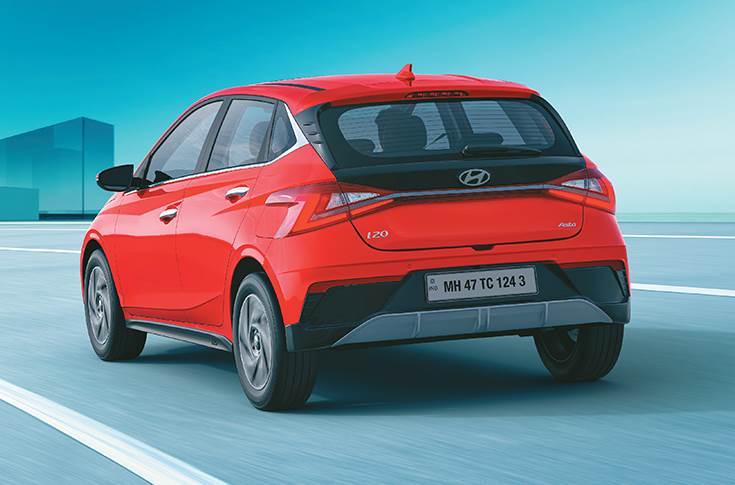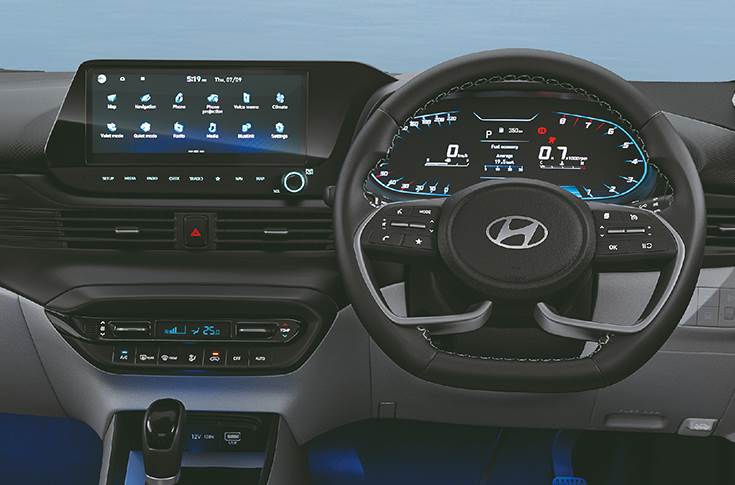Following a slew of teasers, Hyundai has now launched the i20 facelift in India with prices starting from Rs 6.99 lakh, going up to Rs 11.01 lakh (ex-showroom, India). The i20 facelift sports revised front and rear end design, a new colour scheme for the interior along with some new features and is now available only with the 1.2-litre naturally aspirated petrol engine.
As before, the i20 continues to be offered in the following trims: Era, Magna, Sportz, Asta and Asta (O). Here’s a detailed look at the prices of the i20 facelift:

Hyundai i20 facelift exterior design
The updates on the i20 facelift are just to the soft plastic parts. The internals of the front grille sport a new design and it also has a prominent black surround that connects it with the headlamps. Speaking of which, the headlamps are now full LED units on the top-spec trim and get a revised LED Daytime Running Lamp signature, although the overall shape has remained unchanged. Additionally, the Hyundai has now been repositioned from the grille to the base of the bonnet, and gets a new 2D design.
 The front bumper also gets two large arrow-shaped inlets on either side, but it now misses out on fog lamps. Lastly, the front chin has been revised with a more prominent splitter-like element. There are no main changes in profile, but it gets a new design for the 16-inch alloys, and at the rear, it gets a revised bumper with a more prominent dual-tone finish, repositioned reflectors and a faux silver skid plate.
The front bumper also gets two large arrow-shaped inlets on either side, but it now misses out on fog lamps. Lastly, the front chin has been revised with a more prominent splitter-like element. There are no main changes in profile, but it gets a new design for the 16-inch alloys, and at the rear, it gets a revised bumper with a more prominent dual-tone finish, repositioned reflectors and a faux silver skid plate.
The new Hyundai i20 is available in a new Amazon Grey paint shade along with Atlas White, Titan Gray, Typhoon Silver, Starry Night, Fiery Red and dual-tone options of Atlas White + Black Roof and Fiery Red + Black Roof.
Hyundai i20 facelift interior and features
There are, however, no major changes to the interior design, although it gets a new dual-tone black and grey finish for the dashboard and the semi-leatherette seat upholstery on top-spec trim. The all-black interior on the outgoing i20 robbed the sense of space, so this should fare better in that regard. Hyundai has also added a new physical knob for the volume control at the base of the touchscreen, which, previously was operated via haptic touch buttons around the same place.
 The i20 facelift also revised ambient lighting, leatherette padding on the door armrests, puddle lamps with welcome function and Hyundai’s ‘Sounds of Nature’ feature. Elsewhere, it continues with the 10.25-inch touchscreen, all-digital instrument cluster, Apple CarPlay, Android Auto, 7-speaker Bose sound system, wireless phone charger, single-pane sunroof and automatic climate control. There’s also 60+ connected features, OTA updates, voice commands and Type-C charging ports.
The i20 facelift also revised ambient lighting, leatherette padding on the door armrests, puddle lamps with welcome function and Hyundai’s ‘Sounds of Nature’ feature. Elsewhere, it continues with the 10.25-inch touchscreen, all-digital instrument cluster, Apple CarPlay, Android Auto, 7-speaker Bose sound system, wireless phone charger, single-pane sunroof and automatic climate control. There’s also 60+ connected features, OTA updates, voice commands and Type-C charging ports.
Standard safety features include 6 airbags, ABS, EBD, ESC, hill assist control and three-point seatbelts and reminder for all seats. It also gets reverse parking camera, TPMS, and automatic headlamps with escort function. Hyundai is offering a warranty of 3 years/ 1,00,000km warranty with an option of extended warranty.
Hyundai i20 facelift engine, specs
The i20 facelift is now available with a sole petrol engine – a 1.2-litre, four-cylinder naturally aspirated unit, mated to either a 5-speed manual or a CVT transmission. It produces 83hp with the MT transmission and 88hp with the CVT, and 115Nm of peak torque. Interestingly, Hyundai has now discontinued the 120hp, 1.0-litre, three-cylinder turbo-petrol engine that was offered with either a 7-speed DCT or 6-speed iMT transmission.
This was among the most enthusiastic powertrains in the entire segment, so this is a major miss on the facelifted i20. This could perhaps be reserved for the facelifted N Line variants that are yet to launch. Hyundai had already discontinued the diesel engine on the i20 in the transition to the BS6 Phase 2 emission norms.
The i20 facelift continues to rival the likes of the Maruti Suzuki Baleno, Toyota Glanza and Tata Altroz.
In the first five months of FY24, Hyundai Motor India has clocked cumulative sales of 235,305 units (April-Aug 2022: 209,407 / +12.36%). Out of its total volumes, SUVs, including models like the Venue, Creta, Alcazar, Exter, and Tucson, contributed over 53 percent (125,425 units) of the carmaker’s overall sales while cars such as the Grand i10 Nios, i20, Aura and Verna collectively went home to 109,880 buyers between April and August 2023.
